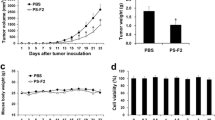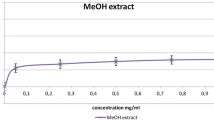Summary
The antitumor activity of an extract of seeds fromAeginetia indica L., a parasitic plant, was investigated. BALB/c mice, inoculated i.p. 1 × 105 syngeneic Meth A tumor cells, were administered 2.5 mg/kgA. indica extract i.p. every 2 days from day 0. The untreated mice died of an ascitic form of tumor growth within 21 days, whereas all the treated mice completely recovered from tumor challenge without any side-effects. The extract did not exert direct cytotoxic activity against Meth A in vitro. Mice that survived after the first challenge as a result ofA. indica treatment overcame the rechallenge with homologous Meth A without additional administration of the extract. On the other hand, those mice could not survive after rechallenge with Meth 1 tumor cells, which were also established in BALB/c mice but were different in antigenicity from Meth A, suggesting the development of antigen-specific concomitant immunity in theA. indica-cured mice. In the induction phase of antitumor resistance in this system, CD4+ T cells appeared to be the main contributors, since in vivo administration of anti-CD4 mAb completely abolished such resistance. In contrast, anti-CD8 mAb administration did not influence the effect ofA. indica. The importance of CD4+ T cells in antitumor immunity was again clarified by Winn assay; that is, spleen and lymph node cells depleted of CD4+ T cells in vitro prior to assay abolished antitumor activity on co-grafted Meth A tumor cells in vivo.
Similar content being viewed by others
References
Bando T, Ohkubo S, Kaji R, Yamagawa T, Iga H, Yoshida H, Sato M (1988) Preparation of interferon γ and interleukin 2-inducer from seed of parasitic plant,Aeginetia indica L. Proc Jpn Cancer Assoc 47: 487
Bitter T, Muri HM (1962) A modified uronic acid carbazole reaction. Anal Biochem 4: 330
Chai JG, Bando T, Kobashi S, Ohkubo S, Oka M, Nagasawa H, Himeno K, Sato M (1990) Anti-tumor effects of extract from seed ofAeginetia indica L on allo-transplantable S-180 tumor. Proc Jpn Soc Immunol 20: 317
Cheever MA, Greenberg PD, Irle C, Thomposon JA, Urdal DC, Mochizuki DY, Henney CS, Gillis S (1984) Interleukin 2 administered in vivo induced the growth of cultured T cells in vivo. J Immunol 132: 2259
Chou T, Shu S (1987) Cellular interactions and the role of interleukin 2 in the expression and induction of immunity against a syngeneic murine sarcoma. J Immunol 193: 2103
Dialynas DP, Quan ZS, Wall KA, Pierres A, Quintans J, Loken MR, Pierres M, Fitch FW (1983) Characterization of the murine T cell molecule, designated L3T4, identified by monoclonal antibody GK1.5: similarity of L3T4 to human Leu3/4T molecule. J Immunol 131: 2445
Fujiwara H, Fukuzawa M, Yoshioka T, Nakajima H, Hamaoka T (1984) The role of tumor-specific Lyt-1+2− T cells in eradicating tumor cells in vivo: I. Lyt-1+2− T cells do not necessarily require recmitment of host's cytotoxic T cell precursors for implementation of in vivo immunity. J Immunol 133: 1671
Gomi K, Morimoto M, Nomoto K (1982) Cytotoxic T-cell-mediated antitumor effect of levamisole against murine syngeneic fibrosarcoma. Cancer Res 42: 4197
Greenberg PD (1986) Therapy of murine leukemia with cyclophosphamide and immune Lyt-1+2− cells: cytolytic T cells can mediate eradication of disseminated leukemia. J Immunol 136: 1917
Greenberg PD, Cheever MA, Fefer A (1981) Eradication of disseminated murine leukemia by chemoimmunotherapy with cyclophosphamide and adoptively transferred immune syngeneic Lyt-1+2− T lymphocytes. J Exp Med 154: 952
Greenberg PD, Kern DE, Cheever MA (1985) Therapy of disseminated murine leukemia with cyclophosphamide and immune Lyt-1+2− T cells. Tumor eradication does not require participation of cytotoxic T cells. J Exp Med 161: 1122
Kobashi S, Bando T, Ohkubo S, Himeno K, Sato M (1990) In vivo anti-tumor effect ofAeginetia indica L against allo transplantable S-180 in mice. Proc Jpn Cancer Assoc 49: 327
Ledbetter JA, Herzenberg LA (1979) Xenogeneic monoclonal antibodies to mouse lymphoid differentiation antigens. Immunol Rev 47: 63
Mill CD, North RJ (1985) Lyt-1+2− suppressor T cells inhibit the expression of passively transferred antitumor immunity by suppressing the generation of cytolytic T cells. Transplantation 39: 202
Morrison DC, Leive L (1975) Fractions of lipopolysaccharide fromEscherichia coli 0111:B4 prepared by two extraction procedures. J Biol Chem 250: 2911
Old LJ, Boyse EA, Clarke DA, Carwell EA (1962) Antigenic properties of chemically induced tumors. Ann N Y Acad Sci 101: 80
Part M, Diorenzo MF, Comoglio PM (1983) Characterization of T lymphocytes mediating in vivo protection against RSV-induced murine sarcomas. Int J Cancer 31: 757
Thompson JA, Peace DJ, Klarnet JP, Kern DE, Greenberg PD, Cheever MA (1986) Eradication of disseminated murine leukemia by treatment with high-dose interleukin-2. J Immunol 137: 3675
Winn HJ (1961) Immune mechanisms in homotransplantation: II. Quantitative assay of the immunologic activity of immune lymphoid cells stimulated by tumor homografts. J Immunol 86: 228
Yamasaki T, Handa H, Yamashita J, Watanabe Y, Namba Y, Hanaoka M (1984) Specific adoptive immunotherapy with tumorspecific cytotoxic T-lymphocyte clone for murine malignant gliomas. Cancer Res 44: 1776
Author information
Authors and Affiliations
Rights and permissions
About this article
Cite this article
Chai, JG., Bando, T., Kobashi, S. et al. An extract of seeds fromAeginetia indica L., a parasitic plant, induces potent antigen-specific antitumor immunity in Meth A-bearing BALB/c mice. Cancer Immunol Immunother 35, 181–185 (1992). https://doi.org/10.1007/BF01756185
Received:
Accepted:
Issue Date:
DOI: https://doi.org/10.1007/BF01756185




